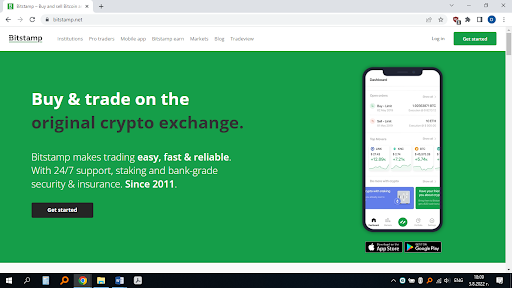
Bitstamp is a crypto exchange suitable for fee-conscious traders, as its fees are lower than what many competing exchanges charge.
You can trade, buy, and sell crypto on this user-friendly exchange, which works well for everyone from novices to advanced traders. As a downside, major cryptos like Binance Coin and Solana are missing from its lineup.
How it works
To open an account, enter and verify your email address and choose a secure and unique password. Then, link to Google Authenticator or another multifactor authentication app.
The exchange has strict Know Your Customer (KYC) requirements in place, which all users must fulfill. They will ask you to upload an image of an official photo ID and a recording of yourself reading a code of three digits.
Your account is sent to undergo review after you submit your pictures and personal details, which include your Social Security number.
You’ll soon be informed that your account is active. Then, you can make your first deposit to the platform. Deposits and withdrawals are possible via international wire transfer or ACH transfers from a bank account, credit card, or debit card. The cheapest option is bank transfer because no fees are charged.
You can buy crypto on the desktop version of the exchange and on the mobile app, which is compatible with Android and Apple.
Cryptos available
· Bitcoin
· Ethereum
· Stellar Lumens
· Uniswap
· Tether
· Litecoin
· USD Coin
· Bitcoin Cash
· Chainlink
· Gemini Dollar
· XRP (for customers outside the US)
Fees range from 0.50% for trades under $10,000 to 0.005% for trades under $20,000,000,000.
Key features
Bitstamp features a simple fee structure, where trading fees depend on the user’s monthly trading volume. High-volume traders enjoy very low fees.
Top-notch security
Bitstamp features top-notch security with 98% of assets in a cold wallet. Wallets that aren’t online are immune to cyberattacks. The remaining 2% held online is used for everyday trading.
Bitstamp’s insurance policy adds another layer of protection. The insurance is effective in cases of theft following a breach of the exchange. If someone misuses your login details and steals from your individual account, your loss won’t be covered.
The exchange’s optional security measures are address whitelisting and two-factor authentication (2FA). The former lets the users choose the addresses where they can receive withdrawals from their accounts.
Intuitive
Crypto trading on Bitstamp doesn’t come with much of a learning curve. You can learn how to trade cryptocurrency quickly and without any hassles on this platform.
Top-rated app
Bitstamp’s mobile app has a 4/5 rating on Google Play based on 11,519 votes at the time of writing. Its rating on the App Store is almost perfect – 4.9/5 – based on 130 reviews. The app offers full trading functionality.
Earn crypto rewards
Bitstamp Earn is available to those who want to earn crypto rewards. This feature lets users stake specific cryptocurrencies and use them to generate funds. However, it’s not available to US customers.
Three platforms
Bitstamp has three platforms. The main one is Bitstamp.net, and there are also Bitstamp Tradeview and Bitstamp Mobile. The second one has more advanced trading forms and charting features.
Pros
Cons
Benefits of using Bitstamp
Everyone who wants to trade crypto on their phone and computer and is looking for an intuitive exchange with low fees will see the benefit of using Bitstamp.
What makes it different from competitors?
The maximum trading fee on the exchange is 0.50%. In comparison, Coinbase charges a 0.50% spread on the main platform plus a transaction fee.
On the other hand, Coinbase has more than 150 assets to trade compared to Bitstamp’s 54. Just two currencies are available for staking on Bitstamp compared to Coinbase’s six.
Bitstamp charges the same trading fees regardless of the platform you choose. Gemini charges lower trading fees to use its advanced platform. It’s all a matter of preference with Bitstamp.
Our final say
The bottom line: Bitstamp has a simple and intuitive platform that novices will appreciate. The main platform features competitive fees. It’s definitely convenient not to have to choose the advanced trading platform just to pay lower fees.
Bitstamp is enshrined in tradition as one of the first digital asset exchanges in history. It’s committed to supporting cryptocurrency users.
As a downside, the list of currencies supported is relatively limited. The exchange has neither lending nor margin trading features. You can stake just two currencies, and the returns are somewhat meager. The highest APR we found was just 5%, but that makes it sustainable.
The post All about Bitstamp: The who, how, and why appeared first on CoinJournal.





